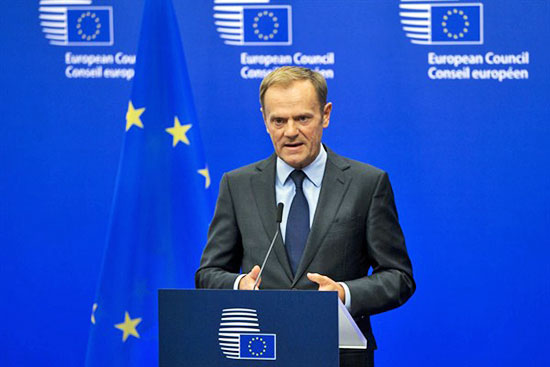|
from
WorldPoliticsReview Website
European Council President Donald Tusk during a media conference, Brussels, Nov. 9, 2016 (AP photo by Virginia Mayo).
Sanctions were first put in place in July 2014 and have been extended ever since. Despite token opposition among some member states, the renewal of sanctions has been relatively routine up to this point.
But there are signs that Europe's united front against Russia is beginning to crack.
...have been the strongest advocates of a hard line on Russia, while,
...have been vocal in their desire to rollback or ease sanctions against Russia.
The Baltic states have political and security reasons for maintaining a hard line on Russia.
Meanwhile, opponents of sanctions include member states with long-standing political and business ties with Russia. Further complicating the debate is Russia's ongoing military intervention in Syria.
The EU has spoken out against Moscow's role in the civil war, in particular condemning Russia for the carnage in Aleppo. In October, the U.K. suggested expanding sanctions to cover Russians involved in the conflict, an idea that received support from France and Spain.
But additional sanctions are unlikely,
given the growing divisions between EU member states over existing
sanctions and the fact that most member states don't see sanctions
as a viable means of changing Russia's behavior in either Syria or
Ukraine.
Were Russia to fulfill its obligations under the earlier Minsk Agreement, most notably withdrawing Russian troops from eastern Ukraine, the EU would lift the majority of sanctions in place, with the exception of those related to the annexation of Crimea.
This is the preferred scenario for the
EU, as it would allow Brussels to claim a major diplomatic victory.
This is looking to be the more likely
scenario, especially since President-elect Donald Trump's transition
team has signaled Trump is considering lifting sanctions on Russia
when he takes office next month. If that happened, the EU's
sanctions would become much less effective.
In France, where business and energy ties, as well as a vocal Russophile faction among political elites, have fueled calls for a more cooperative relationship with Moscow, center-right Republican presidential candidate Francois Fillon is in favor of scrapping the EU's Russia sanctions.
Perhaps unsurprisingly, Russian
President Vladimir Putin
has called Fillon "upstanding."
Russia's meddlingin European politicsneeds to be handled deftly.
German Chancellor Angela Merkel, who has been one of the strongest supporters of EU sanctions against Russia despite Germany's deep trade ties with Russia, is facing a growing election threat from right-wing populists that could adjust her calculus on Russia and sanctions.
Germany has suffered the largest absolute economic loss from the EU's sanctions, according to a report by the Graduate Institute of International and Development Studies Geneva.
Several of Germany's largest businesses, including,
...have expressed their opposition to sanctions, as have members of Merkel's own party.
If Merkel wins re-election, she might be
able to shore up the EU's policy toward Russia. But if she were to
lose, the EU could take a more conciliatory approach.
The Russian hacking of the Republican and Democratic parties in the U.S. to swing the recent presidential election in Trump's favor - which is now the consensus of the U.S. intelligence community - has many worried that Russia might try to meddle similarly in Europe's upcoming elections.
This is a particular concern in Germany,
which Moscow sees as its biggest Western critic and the driving
force behind maintaining sanctions, and where Merkel's popularity is
not what it once was.
Earlier this week, Austria's far-right Freedom Party, whose candidate narrowly lost a second-round vote for the presidency in early December, signed a cooperation deal with Moscow.
France's far-right National Front, whose leader Marine Le Pen is expected to be a front-runner in next year's presidential election, borrowed $11 million from a now-defunct Russian bank in 2014, and in February this year asked Russia for a $30 million loan to help fund the party's presidential and parliamentary campaigns.
The National Front
is still struggling to find the funds for next year's
presidential campaign. Putin has also
provided financial and moral support to far-left and far-right
parties in Germany.
Even if sanctions crumble, it's hard to see the EU and Russia turning the page on broader relations anytime soon, especially not if the EU expects Russia to adopt its norms and values.
Improving ties on Russia's terms is an option, explains Liik,
|


